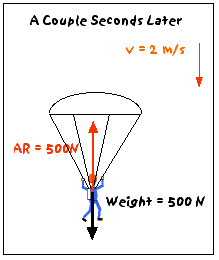A 2-kg object is dropped from a height of 1000 m. What is the force of air resistance on the object when it reaches terminal velocity?
1 Answer
Nov 26, 2015
Explanation:
The falling object experiences its weight acting downwards and the air resistance in the opposite direction.
The air resistance increases with velocity so there may come a point, depending on the shape of the object and if there is sufficient height, where these 2 forces are equal.
Since the object has no net forces acting on it it will, according to Newton, no longer accelerate but continue with a constant velocity.
This is called Terminal Velocity.
So:
Air resistance = weight

In the graphic you can see that the large air resistance of the parachute is balanced by her weight. She floats to the ground at a constant, terminal, velocity.

